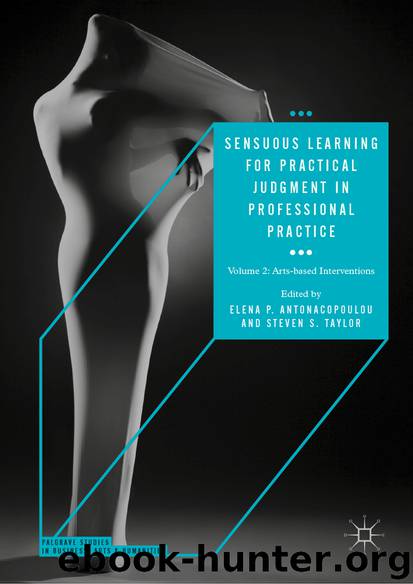Sensuous Learning for Practical Judgment in Professional Practice by Elena P. Antonacopoulou & Steven S. Taylor

Author:Elena P. Antonacopoulou & Steven S. Taylor
Language: eng
Format: epub
ISBN: 9783319990491
Publisher: Springer International Publishing
Content and Context
We wanted to engage a cross-professional group working with ‘lonely seniors’ in the Danish health care sector in a research process to work with welfare through this lens of thoughts in movement, affective co-motions and passages to ecologies of events. In close dialogue with a manager of a municipality senior centre, we invited all the professionals working closely with seniors to engage in a process of creation to incorporate this affective and philosophical approach into a raft of research-generated events. In total, we conducted experiments involving up to 150 professionals over two days as part of a research project called Strategic Management of Welfare in Movement at Copenhagen Business School.
The research process was informed by nonrepresentational studies and by Massumi and Manning’s studies and experiments in the so-called Senselab (Manning and Massumi 2013; McCormack 2008; Murphie 2008; Thain 2008). All of this work is inspired by the French philosopher Gilles Deleuze’s understanding that our critique of society is not ‘hard’ enough because we are primarily engaged with knowledge as social representation and are therefore distanced from felt experiences. The Senselab experiments are about creating new felt experiences of philosophical conceptualisations by using nonfunctional techniques (e.g. dance) to intensify concepts as felt thoughts in movement in the gap between research and art. Here, the gap is understood as a creative space engendering potential new knowledge before that knowledge again diverges into what are often separated and isolated areas. 1
Informed by studies of research as creation, it becomes interesting to work an awareness of the vague, the ‘useless’ and the non-articulated into more hopeful research on welfare management, using nonfunctional techniques . This philosophical approach also aligns with studies of how the unknown can be used to handle crisis in organisations (Antonacopoulou and Sheaffer 2014). The philosophical and theoretical ambition is to change philosophy from a navel-gazing activity to affirm, intensify and multiply the thinking-feeling of what happens (Manning and Massumi 2014a; Massumi 2002). As well as thinking about the world and welfare management out there, it is about exploring concepts as felt experiences and therefore as movements that can move our thoughts from within our practices (inflexions).
Using nonfunctional techniques to incorporate the affective approach into a process of research and intervention is also about reformulating welfare management. When understood as a matter of defining one task, one activity and one outcome, we do not know what the problem is or could be, or what categories or innovations might solve it. However, the problem is not ‘out there’ or separated from us, waiting for solutions to be implemented. Instead, through experimentation with nonfunctional techniques , we are mutually engaged in the becoming/learning and organising processes of meetings between professionals, citizens and researchers. By experimenting with nonfunctional techniques —that is, by engaging with ‘useless’, vague, affective and loose knowledge—we can intensify welfare as thought in movement and as affective-co-motions. Rather than inventing a specific solution, nonfunctional techniques can also move across sites and potentially create conditions for a singular unfolding of the event (Himada and Manning 2009).
Download
This site does not store any files on its server. We only index and link to content provided by other sites. Please contact the content providers to delete copyright contents if any and email us, we'll remove relevant links or contents immediately.
Weapons of Math Destruction by Cathy O'Neil(6264)
Cracking the GRE Premium Edition with 6 Practice Tests, 2015 (Graduate School Test Preparation) by Princeton Review(4278)
What It Really Takes to Get Into Ivy League and Other Highly Selective Colleges by Hughes Chuck(3744)
Fooled by Randomness: The Hidden Role of Chance in Life and in the Markets by Nassim Nicholas Taleb(3105)
The Tyranny of Metrics by Jerry Z. Muller(3065)
The Marketing Plan Handbook: Develop Big-Picture Marketing Plans for Pennies on the Dollar by Robert W. Bly(3046)
Ultralearning by Scott Young(2944)
The Official Guide for GMAT Review 2015 with Online Question Bank and Exclusive Video by Graduate Management Admission Council (GMAC)(2798)
Bull by the Horns: Fighting to Save Main Street From Wall Street and Wall Street From Itself by Sheila Bair(2658)
50 Economics Classics by Tom Butler-Bowdon(2568)
The Visual MBA by Jason Barron(2153)
Data Science for Business by Foster Provost & Tom Fawcett(1969)
The Inevitable by Kevin Kelly(1968)
Cracking the LSAT, 2012 Edition by Princeton Review(1947)
Out of the Crisis by Deming W. Edwards(1894)
GMAT Official Guide 2018 Verbal Review by GMAC (Graduate Management Admission Council)(1851)
The Personal MBA: Master the Art of Business by Josh Kaufman(1821)
The Conflict Resolution Phrase Book by Barbara Mitchell & Cornelia Gamlem(1773)
Maths and Stats for Web Analytics and Conversion Optimization by Himanshu Sharma(1701)
